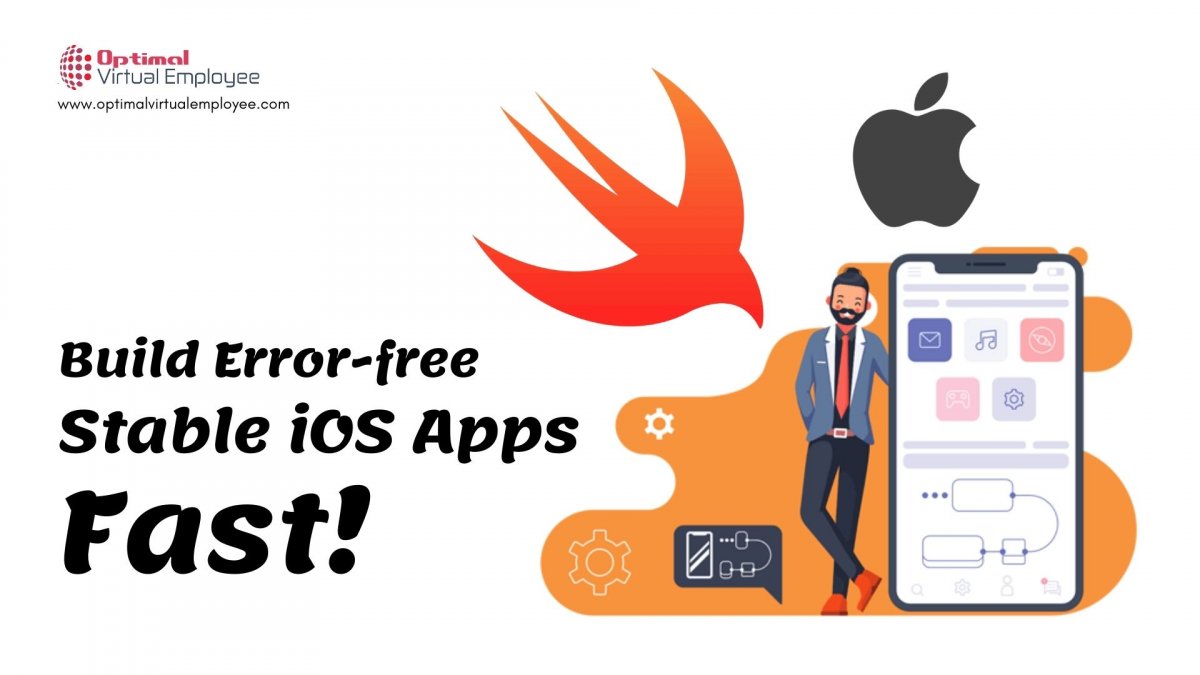An object-oriented programming language, Apple launched Swift in 2014. It was introduced for software development, an improved option apart from2 Objective-C.
Here are the top reasons why app developers choose Swift for the app development process.
Reasons to choose Swift for the app development
-
Easy Programming Language
While there are programming languages that work with complex command lines, Swift is popular for its explicit syntax that is simple to read and write compared to various others. Swift does not use semicolons at the end lines as a programming language, nor are there any brackets that encircle conditional expressions inside if/else statements. The coding process, on the whole, is simply because the method and function call in Swift use a comma-separated list of parameters along with brackets.
It is an easy-to-grasp language with its minimal coding, making it a more suitable choice than other languages and cutting short the time to market an app. The codes written in Swift are more like plain English texts when looked at, which makes it easier to configure mistakes. App developers prefer Swift as it is a highly reusable language, with only a few lines of code even for difficult tasks. They can use certain codes without any change in another part.
-
Maintenance
Swift is a go-to choice for iOS app development because of its simple maintenance needs. Swift’s predecessor Objective-C was a programming language that was solely dependent on C. But in the case of Swift, there are no such dependencies. Compared to Objective-C, it is much easier to maintain. With C and Objective-C, iOS developers often maintain two code files, header (.h) and implementation files (.m). This helps them be efficient in terms of coding timelines.
App developers using Swift combine two files into a single code file (.swift). They can focus on app logic and code quality for a better iOS app. No need for developers to synchronize the method name and comment between files manually with Swift. Without multiple dependencies, it’s a fairly simple language to work with and maintain.
-
Stability
Modern app developers appreciate safety and security as the primary features in any app development language. It helps them find a competitive edge in modern app markets. Swift features an enhanced typing system and unique error handling capabilities for iOS development. It is a robust language with safety at its heart. The feedback loop is short with Swift as developers can track errors as they code. It takes the nil code and publishes compiler errors when a programmer writes bad code.
Over the years, there have been fewer problems and crashes with Swift, so it is popular as a stable programming language. Moreover, its simple syntax reduces the chances of an app developer making mistakes, an additional layer of security when you look at it.
-
Open-source
Apple’s announcement making Swift an open-source language came in 2015. It boosted the popularity of Swift a notch up. Free access led to its greeted adoption by all kinds of businesses to save the iOS development cost. Since open-source languages are highly customizable, they can match the project requirements, track bugs and allow up-gradation. Apple is a terrific owner who takes continuous feedback from the community and iterates those changes in the programming language. The consistent improvement in Swift is thanks to developers who contribute to its success.
-
Speed
Apple launched Swift to improve speed and execute app logic fast. Swift boasts of the fastest algorithm calculation metric and ensures fast operations. With Swift, app developers use high-order functions and generics to generate clean and reusable codes and save time.
Speed is a USP of Swift programming language both during the iOS development and testing phase. Speed of iOS app development also ensures reduced app development costs. Compared to Objective-C, Swift promises a speedier performance with a single code file. Hire mobile app developer to use Swift intelligently and launch your iOS apps in the market fast.
-
Support
Unlike its predecessor Objective-C, Swift supports dynamic libraries. Meaning it uses small pieces of code that are easily integrable with apps during runtime and load time. Thanks to the dynamic libraries, apps developed with older versions of the language can update with the latest releases.
This ensures any apps that an iOS developer works on will easily transition to future releases of Swift. In addition, Dynamic libraries are uploaded to the memory, which cuts down the app size and increases the app performance speed.
-
Interactive Coding
Swift features the Playground that allows iOS developers to create new algorithms in real-time. It omits the need for entire app development at once. The language has Read-Eval-Print-Loop or REPL for help with learning, experimenting, and rapid prototyping. The team at Apple has also added inline code execution to help developers create a pile of codes or algorithms while getting feedback.
Feedback improves the speed of code writing thanks to data visualization. Swift’s Playground thus ensures accessible app development. Inline code execution helps app coders develop mass algorithms while they receive simultaneous feedback.
In the End
Swift escalated quickly to become a well-adorned iOS development programming language in the app developer circle. Apple works hard to make Swift the best-in-class for iOS app development and is highly responsive in making changes. If you are a business looking for an accessible, low-cost, and minimal error-prone coding language for your iOS app, Swift is the best choice available.









